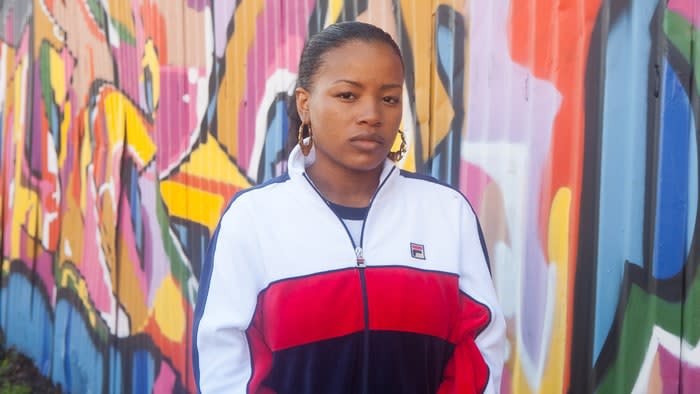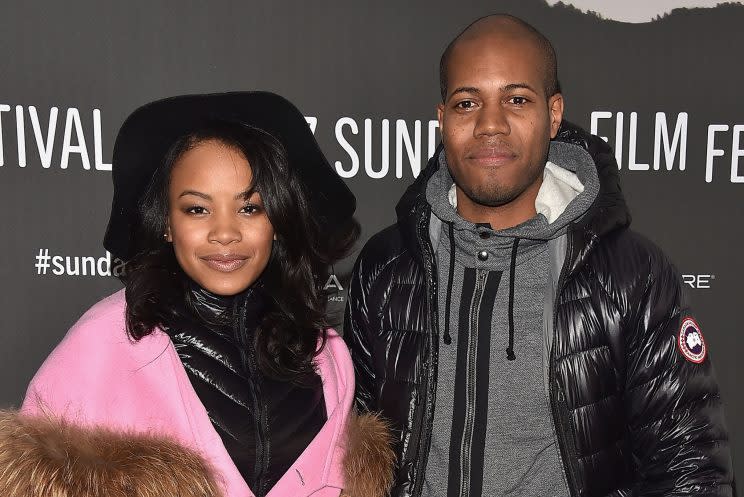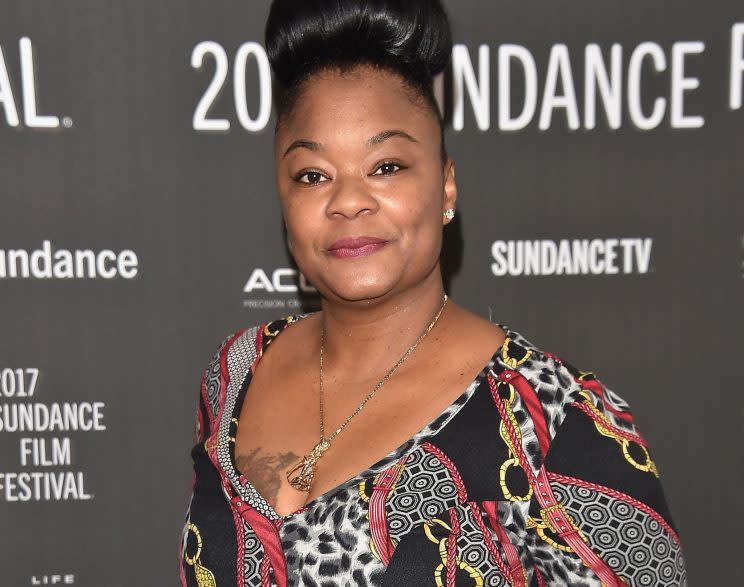Sundance Report: How 'Roxanne Roxanne' Tells Coming of Age Story of Hip-Hop Pioneer — and Introduces Breakout Star Chanté Adams

Roxanne Roxanne — Michael Larnell’s biopic about old-school hip-hop icon Roxanne Shanté that premiered Sunday at the Sundance Film Festival — doesn’t walk the line, get on up, and follow the groundbreaking female rapper straight outta Queensbridge. The film is more concerned with being a human biopic than music biopic, functioning as a coming-of-age character study that just so happens to follow a teenage musician on the brink of revolutionizing her genre.
“When I heard her story, she had to overcome a lot,” 38-year-old St. Louis native Larnell, in Sundance with his sophomore directorial effort two years after bringing his shoestring-budgeted debut, Cronies, told Yahoo Movies. “So either I could tell her story and focus on the music and gloss over what she had to overcome, or gloss over the music and focus on what she had to overcome. I thought [that latter would] be more powerful. Then you can weave the music in there as she’s trying to survive and show she still has this career that she’s trying to manage. The human [story] was more important to me.”
The film introduces Shanté at age 9 (played by Taliyah Whitker), and the confident wunderkind is a fierce battle rapper. At 14 (played by Chanté Adams), Shanté is still hustling the battle-rap circuit, helping mother Peggy (Nia Long) earn enough dough to move out of the sprawling and infamous Queensbridge projects, but her teen years are a stark contrast in personal trauma and artistic success. Peggy’s boyfriend runs off with their money, sending her into a downward spiral of alcoholism and anger. Shanté shoplifts, slings drugs, and moves in with a low-level dealer.
After recording the single “Roxanne’s Revenge” a response to the U.T.F.O. hit “Roxanne Roxanne” cuts with producer Marly Marl (Kevin Phillips), Shanté becomes an overnight hip-hop sensation and adapts her famous stage name. By 16, though, she becomes involved with the drug kinpin Cross (Moonlight Oscar nominee Mahershala Ali), and the relationship is abusive and dangerously violent.

After Cronies, a black-and-white drama about three twentysomething men cruising around St. Louis funded in part through a grant from Larnell’s NYU professor Spike Lee, Larnell said he was intent on directing a follow-up with a female protagonist. He was introduced to producers Nina Yang Bongiovi and Mimi Valdes, who along with Pharell Williams and Forest Whitaker had just shepherded one of Sundance 2015’s breakout hits, Dope, to the big screen.
Bongiovi and Valdes had been toying with the idea of making a Roxanne Shanté biopic after the rapper hosted Dope‘s premiere afterparty. “They approached her like, ‘Can we make a movie about you?’ She didn’t believe them. She thought they were some drunk college kids,” Larnell laughed. Bongiovi sent Larnell the video for “Roxanne’s Revenge” and gauged his interest. Their collaboration was hatched.
In addition to illuminating the story of one of rap’s most important pioneers, Roxanne Roxanne also introduces one of 2017’s most exciting breakout stars. Chanté Adams is a revelation as Roxanne Shanté (“That was just a sign,” Shanté said of the eponymous connection at the Sundance premiere Q&A), delivering a confident, emotionally rich performance — and nailing the old-school cadence of her subject’s lyrical delivery.

Larnell, his producers, and casting director Jessica Daniels looked at nearly 600 actresses in their search for a young woman to portray Shanté. The 22-year-old Detroit native Adams had just graduated from Carnegie Mellon University and was spotted by the casting team at CMU’s senior showcase in New York. The project marked her first professional audition. She had no prior background in hip-hop, but rapped “Roxanne’s Revenge” in the tryout. After a couple callbacks, Adams was cast — a short week-and-a-half before the film was set to go into production.
“I saw that she could do everything we needed her to do,” Larnell said. “Rap, perform, act younger, act older, dramatic, comedy. She was well-rounded.”
Then came time for Adams to meet her subject. “I remember sitting down on a couch and hearing her coming down the hallway, I had watched that many interviews that I could recognize her voice,” Adams recounted. “And my heart was just beating so fast. I was really nervous. But as soon as I saw her, she gave me the biggest hug and said, ‘You look like me!'”
Shanté, who had also advised Larnell on the script, was a regular presence on set — and an invaluable resource for Adams. “During the concert scene, I wasn’t doing The Wop right,” Adams said in explaining one example. “So she would take me offstage when we would cut and take me around the corner and we’d practice it together. She literally taught me how to perfect this dance.”
Adams appreciates the humanistic approach Larnell took with the script. “Just like everybody else I had no idea about all the things she went through,” the actress said. “Usually these kinds of biopics talk about their coming of fame and their struggles through the industry. And of course she had her struggles in the industry, but her main struggles were outside the industry.”

